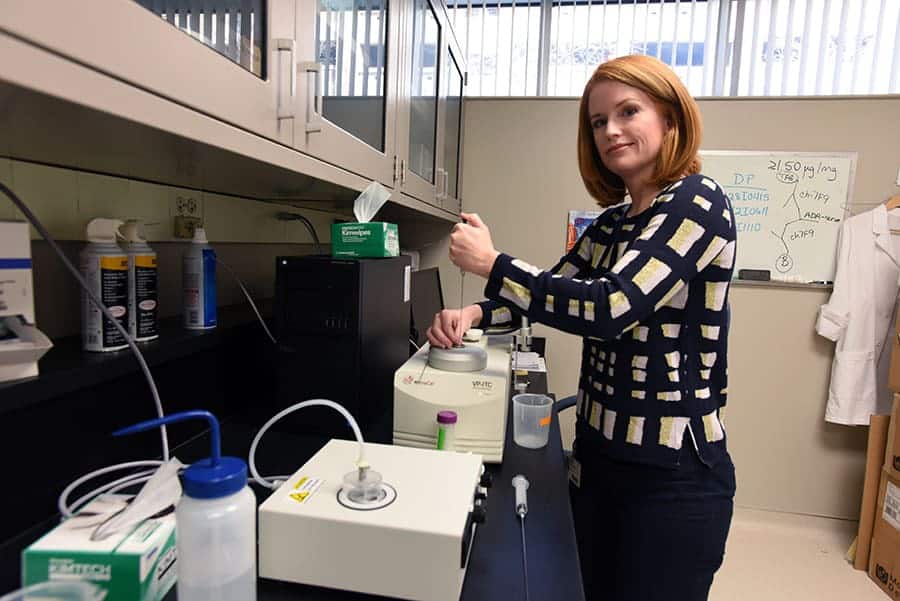Based on UAMS Research, InterveXion Wins Grants, Partners with BioVentures’ Help
| Feb. 20, 2018 | Truly good ideas like the one around which InterveXion was built have staying power.
Since InterveXion was established as a company in 2004, granting agencies and others have continued to value both the company and its mission.
BioVentures from the first saw merit in the new treatment for methamphetamine abuse developed at UAMS by Michael Owens, Ph.D.; Brooks Gentry, M.D., and Ralph Henry, Ph.D. and urged them to start a business for it.
A not-for-profit entity, BioVentures performs technology transfer and intellectual property commercialization activities on behalf of UAMS. The university assigns its rights in intellectual property developed by its researchers to BioVentures, which is responsible for commercially developing that technology. BioVentures also manages a laboratory-based incubator facility.
InterveXion’s investigational treatment, which has been under development in that lab and others, makes use of a monoclonal antibody, IXT-m200. The antibody works to help a drug user stay in treatment by binding the methamphetamine and keeping it from going into the brain, so users don’t get the high they are expecting. The treatment is planned to be used together with behavioral therapies if approved by the FDA.
Owens, Gentry and Henry collaborated on its creation. Gentry is a professor and chair of the Department of Anesthesiology in the UAMS College of Medicine and InterveXion’s chief medical officer. Owens is a professor in the Department of Pharmacology and Toxicology in the UAMS College of Medicine and InterveXion’s chief scientific officer. Henry is InterveXion’s vice president of biopharmaceutics and Distinguished Professor of Biological Sciences at the University of Arkansas, Fayetteville. Misty Stevens, Ph.D., M.B.A., joined InterveXion shortly after and serves as operations director. Keith Ward, Ph.D., assists the company with product and business development matters.
Owens said in the early years, BioVentures helped them structure their new business in a way that avoids any conflicts of interest or conflicts of commitment.
“None of us at the time wanted to leave the university,” Owens said. “BioVentures afforded us an opportunity where we could be full-time faculty members and still be collaborative with a company to take the medicine forward. Without taking it forward with a pharmaceutical company, it didn’t have a chance of getting approved. It was a new idea as a therapeutic agent.”
The concept of using an antibody in drug treatment was so innovative it has taken years of work to prove its safety and potential effectiveness. It’s also work that’s paying off and getting positive attention.
In October, the National Institutes of Health (NIH) National Institute on Drug Abuse awarded the InterveXion/UAMS research team an $8 million, three-year grant to fund STAMPOUT (Study of Antibody for Methamphetamine Outpatient Therapy). This will be the first clinical study in methamphetamine users of a medication developed specifically for patients who are meth users.
The small team at InterveXion has appreciated the legal and business advice BioVentures has provided, but laboratory space in the BioVentures building on the east side of the main UAMS campus has been important, too.
“It’s the lab support and the intellectual help we get from BioVentures,” Owens said. “They’re the venue that allows us to take our intellectual property and license it from them. Every patent still is owned by BioVentures. There are seven active patents, and BioVentures pays the fees on that as their investment in us.”
The $8 million grant in 2017 follows on the heels of two grants from NIDA totaling $14.5 million awarded in 2015. Those grants supported production of the antibody, research into whether it was safe to use in human clinical trials, and development of a novel methamphetamine vaccine.
InterveXion has stacked up other notable achievements in addition to its grant-winning success, including licensing the Asian rights to IXT-m200 to Tokyo-based Ascent Therapeutics and winning a Fast Track designation from the FDA.
“IXT-m200 has the potential to address an important unmet medical need as well as a serious social problem afflicting Asian countries,” Ascent CEO John Winebarger said in January in a news release. He said the collaboration between the two companies also can leverage Ascent’s Asian development expertise to enhance product value for biotech companies like InterveXion that lack a base in Asia.
In early 2016, InterveXion gained Fast Track status, which provides for frequent consultation with the FDA and potential eligibility for accelerated approval and priority review.
“Fast Track with the FDA means a faster turnaround on questions to the administration,” Owens said. “That’s the biggest part of it. It’s working well for us.”
A bright future might well lie ahead for a company that’s innovations promise to brighten the futures of people and communities devastated by methamphetamine abuse.

